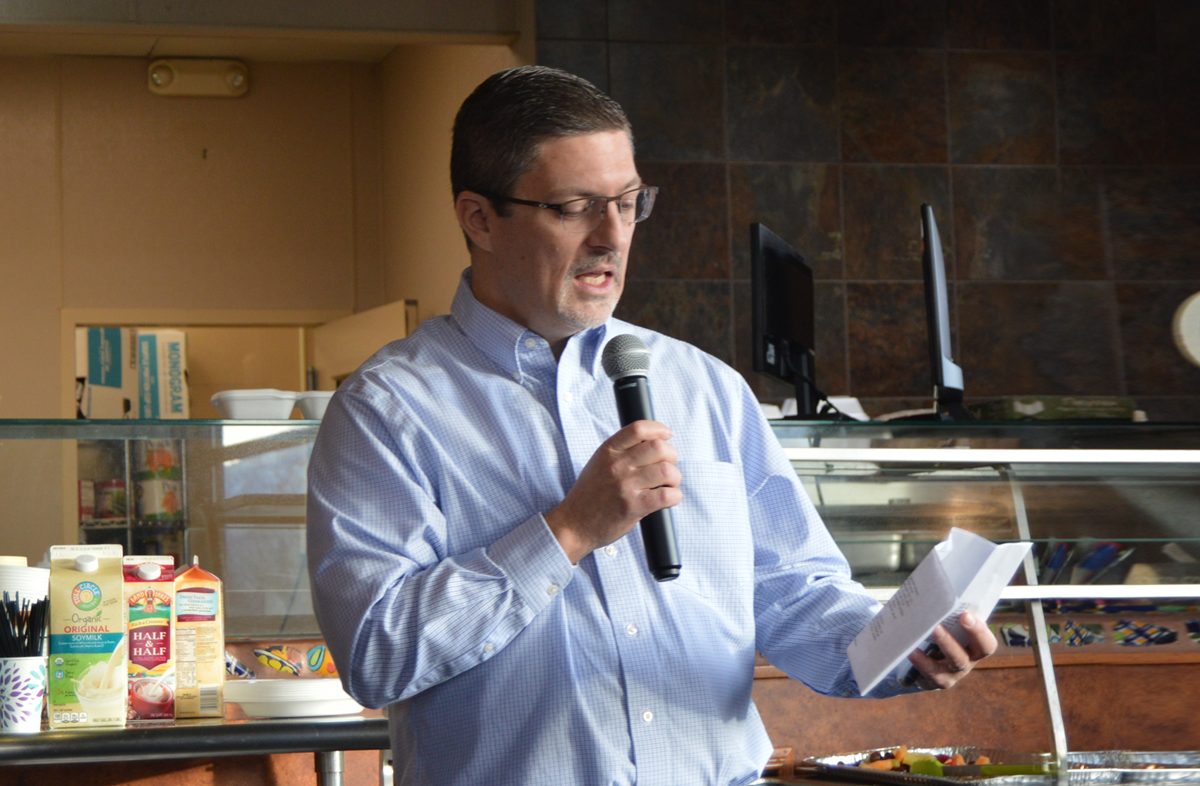Vest Pocket Hosts Annual Legislative Warmup

On January 18th, Vest Pocket members and guests gathered for breakfast at CousCous Mediterranean Grill in Murray to hear Deseret News political columnists and professional lobbyists Frank Pignanelli and LaVarr Webb talk about the upcoming 2018 Utah legislative session affecting local independent businesses. Pignanelli and Webb have spoken at Vest Pocket’s legislative warm-up breakfasts for several years.
Webb opened by highlighting the top priorities for Utah business this session:
• Tax reform in general — especially federal tax reform and its impact on Utah, with the federal government expected to return more federal money back to Utah.
• Comprehensive State tax reform— the current tax system was developed in the 1950’s based on a manufacturing-based economy and does not reflect the service-based economy of today. The legislature will also be looking seriously into adjusting the sales tax rate and opportunities to collect sales tax.
• Personal Property tax — Legislators are considering changing the business personal property tax system substantially (this is an issue Vest Pocket will be advocating strongly about during the session)
• Real Property tax—Utah has fairly low real property taxes compared to other states. Some legislators have a concern that real property taxes may be too low.
Webb said that the mantra that is being heard over and over is “Broaden the Base, lower the Rates.”
Other areas of interest Webb touched on for the upcoming legislative session included six citizen ballot initiatives:
• “Tolling” the Canyons—Vehicle tolls will be discussed as a way to increase the number of people using public transport or carpooling to keep fewer people from driving up the canyons. Little Cottonwood Canyon road is the most dangerous for potential avalanches.
• Funding for schools—there may be a proposed dramatic increase in school funding. There is also a ballot initiative proposal in place. Surplus tax funds are being looked at as possible source. “Our Schools Now” is heavily supported this year by large teacher groups.
• Medicaid Expansion— this issue is getting close to being another initiative on the ballot. It would expand eligibility to persons with incomes up to 138% of the poverty level.
• Medical Marijuana— this may be another ballot initiative, and it is getting close to having enough signatures to being on the ballot.
• Air Quality— on the Salt Lake Chamber’s top list of priorities.
• Transportation Bill and governance of the UTA—proposed change to a three-member, full-time commission, rather than the current 16-member board.
Webb added that “all of these [ballot initiative] issues are important and have been debated, but not yet dealt with, by the legislature. This is the people’s way of doing so.”
Pignanelli, an attorney, lobbyist, and political adviser, was one of the youngest ever in Utah to be elected to a Utah state office, serving in the House of Representatives for 10 years.
He began by reiterating the issue of property tax, stating, “I think you are definitely on to something, (referencing Vest Pockets advocacy committee’s progress in the area) it will impact counties, but this session is being driven by the six initiatives.”
According to Pignanelli, the initiative that has the best shot is the “Our Schools Now” initiative, due to the fact that the supporters are well funded and have a large network of teachers backing it. Pignanelli said, “You really need to talk to your lawmakers, think about what connections you may have. You need to be engaged in the process, tell your story.”
Business-focused bills that Pignanelli highlighted included:
• Market Place Fairness (a/k/a “e-fairness”—the 2018 legislature is unlikely to return to this issue because the U.S. Supreme Court has decided to take up the South Dakota case on this issue and will make a ruling by the end of 2018.
• Food Tax adjustment—while there is some public sentiment to remove the food tax entirely, the legislature may actually increase the sales tax on food
• Certified tax rates—watch for impact on small business.
• Non-compete clauses – while already limited by law to one year, the legislature may, in the future, restrict them with respect to the types of employees subject to them.
• Panhandlers in the Rio Grande neighborhood in SLC —Rep. Hughes has made a difference in this situation. Pignanelli said in his recent visit to 600 West, the area looks drastically different.
• Alcohol bill—the allowable blood alcohol limited will be reduced to .05 effective December 30, 2018. This law will change businesses that serve alcohol. There is also some question on changes to insurance liabilities.
House Speaker Greg Hughes has announced he will not be running again, but it is evident that he wants to run for Governor in 2020.
Other Business bills:
• Single person sign-off through the Department of Commerce.
• LLC – a proposal to allow registration as a “benefit LLC”
• Air Quality—harder to recruit businesses now due to air quality concerns.
Pignanelli wrapped up by saying, “Communicate your concerns, reach out to smaller chambers, and businesses, create a coalition and approach the law makers, this will drive interest for them to do something.”










